Discover the top alternatives to 7shifts to streamline your employee scheduling and management. Explore Connecteam, Gusto, Homebase, Findmyshift, and Sling for outstanding solutions.
Getting employee scheduling right is crucial to keep everything running smoothly—especially in restaurant operations. Cloud-based software solutions like 7shifts have revolutionized how managers organize shifts, handle time-off requests, and track labor costs.
While some 7shifts users have found success with the platform, others are seeking more comprehensive features and a better user experience. In this article, I explore 5 top alternatives to 7shifts to help you find the best solution for your business.
Our Top Picks
-
1
The best alternative to 7Shifts
-
2
Good for payroll and HR management
-
3
Good for small businesses and restaurants
Why trust us?
Our team of unbiased software reviewers follows strict editorial guidelines, and our methodology is clear and open to everyone.
See our complete methodology
What is 7shifts?
7shifts is a popular employee scheduling and management software designed for the restaurant industry.
Its features include drag-and-drop scheduling, time tracking, and payroll integration. The platform helps managers reduce labor costs, ensure compliance with labor laws, and improve overall employee engagement and retention.
The platform stands out for its restaurant-specific features, like tip management.
The mobile app allows employees to swap shifts, request time off, and communicate in real-time. Despite the platform’s strengths, some users are seeking more comprehensive alternatives that cater to broader business needs.
Why Are People Moving Away From 7shifts?
While 7shifts has received praise for its ease of use and industry-specific features, it’s faced criticism in several areas. Reviews on GetApp, Capterra, Software Advice, and G2 highlight some areas of concern.
One user says, “switching between week and daily view drives me crazy.” Meanwhile, another user claims the mobile app is “confusing,” with notifications often failing to deliver. Some have reported problems with payroll integration, as well, with one reviewer noting that payroll processing takes “way too much time”—especially when factoring in breaks.
Scheduling features aren’t without issues, either. The absence of an edit button means users must delete and rewrite reports if there’s an error, and one reviewer describes forecasting as “clunky.” Additionally, the system generates “too many notifications” about overtime risk, which—according to another user—can be unhelpful. And another customer mentions glitches, like updates causing “problem after problem” and apps and websites being “regularly unusable.”
The mobile version is also reported to be buggy and sometimes runs slow, with frequent updates and error pages, according to some Capterra reviews.
All things considered, businesses are exploring other options that offer more advanced features, better integrations, and enhanced functionality.
The 5 Best 7shifts Alternatives of 2026
-
Connecteam — The best alternative to 7shifts
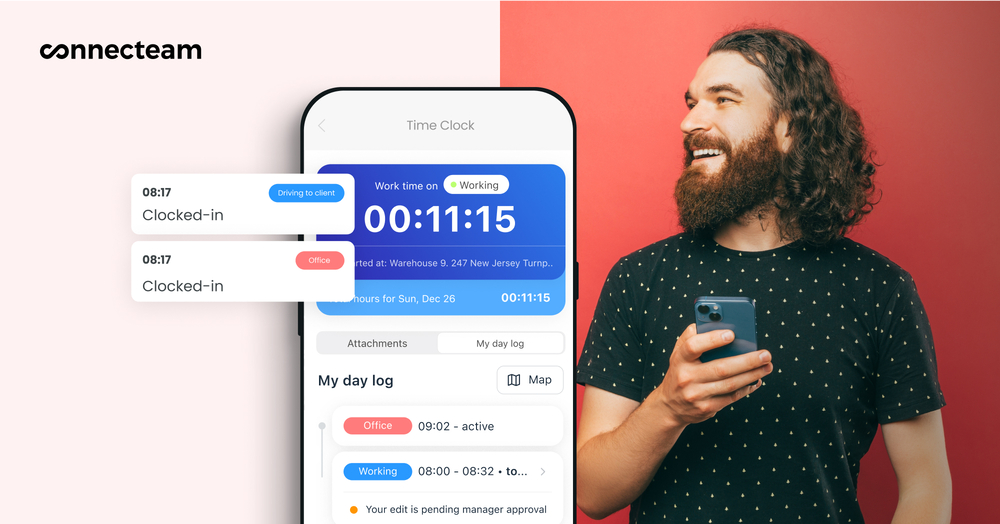
Connecteam is a comprehensive workforce management solution tailored to meet the needs of various industries, including restaurants.
Why I chose Connecteam: Connecteam provides an all-in-one platform that goes beyond scheduling—from the 1-click employee time clock to mobile time tracking to task management. It’s a user-friendly option that addresses many 7shifts users’ pain points.
Let’s take a closer look at some of Connecteam’s impressive features.
User-friendly scheduling
Connecteam’s drag-and-drop employee scheduler makes it easy to create, edit, and publish schedules. The intuitive interface ensures that you can quickly adapt to changes and communicate updates to your team. There’s even a selection of templates to streamline scheduling further, and you can replicate schedules to save time.
Last-minute changes are common, particularly in a dynamic restaurant environment, so I appreciate that Connecteam enables users to swap shifts remotely from the mobile app. What’s more, employees receive real-time notifications about any changes you make to schedule.
Connecteam also offers AI scheduling features that allow you to assign shifts automatically based on employee availability and predefined rules, reducing effort to a single click.
I love that Connecteam enables shift attachments. For instance, a restaurant manager might attach restaurant checklists to shifts to ensure crucial tasks get done.
Advanced time tracking and timesheets
With an employee time clock with built-in GPS tracking, you can monitor employee locations and clock-ins in real time, ensuring accuracy and accountability. Connecteam also supports geofencing—meaning you can create a virtual boundary created around work sites (like restaurants or cafes) to ensure employees can clock in only when they’re at the correct location.
I find the kiosk app one of the smartest features for restaurant staff and other teams that operate from a single location. It enables employees to quickly clock in from any central device using a unique PIN code.
All timesheet data is automatically populated into timesheets for payroll. I love that Connecteam lets you specify custom pay rates on an employee or job basis—and automatically updates timesheets with the correct pay.
Payroll integrations
Connecteam integrates with various third-party payroll applications, including QuickBooks Online and Gusto. The seamless integrations ensure a really simple payroll process where worked hours, overtime, and paid time off are captured, auto-synced, and automatically calculated for accurate payroll.
Comprehensive communications and notification tools
Connecteam includes in-app chat, updates, and employee directories, facilitating easy communication across the organization. The communication tools are integrated with scheduling, making it easy to notify staff about shift changes or urgent updates.
It’s also incredibly easy to set up custom notifications and alerts for individuals and groups of employees. For example, you can remind employees that their shifts are coming up.
You can also set thresholds for overtime and receive overtime alerts. This proactive overtime management and employee oversight helps you control labor costs and prevent burnout.
Time off management
Connecteam stands out when it comes to time off management. Real-time visibility of employee availability makes it super easy to create conflict-free schedules with all shifts covered. Unlike 7shifts, Connecteam enables employees to book time off in advance so you can factor this in when creating schedules.
The platform’s comprehensive calendar view—which shows approved time off alongside scheduled shifts—helps managers plan ahead while balancing workloads.
Compliance and reporting
Connecteam includes compliance management features to help businesses adhere to labor laws and regulations. For example, you can create and enforce custom time-off policies, including accrual rates, blackout dates, and maximum allowable leave. You can also automatically log employees out for breaks to comply with meal and rest break laws.
Connecteam also offers detailed reporting tools that provide insights into labor costs, attendance, and productivity, helping you make informed decisions.
The seamless payroll integrations ensure accurate tracking and reporting of employee hours and wages—helping with wage and hour law compliance and preparing you for audits.
And so much more at a competitive price
Connecteam’s functionality doesn’t end there. It offers tons of other tools to help you manage your operations, stay connected with your team, and train and retain your workforce.
Plans start at $29 per month, significantly lower than 7shifts’ pricing. The Business Plan also includes advanced time tracking and reporting, providing more value and cost savings for businesses. This is particularly pertinent for small or start-up restaurants that don’t need the level of functionality that large franchises do. There’s also a free forever plan for businesses with fewer than 10 employees.
Key Features
AI scheduling
GPS time tracking
In-app communication
Integration with payroll
Mobile app access
Detailed reporting and analytics
Pros
Comprehensive feature set
Excellent customer support
User-friendly interface
Flexible pricing plans
Cons
More integrations in development
Pricing
Free-for-life plan availablePremium plans start at $29/month for 30 users
14-day free trial, no credit card required
Start your free trial -
Gusto — Good for payroll and HR management
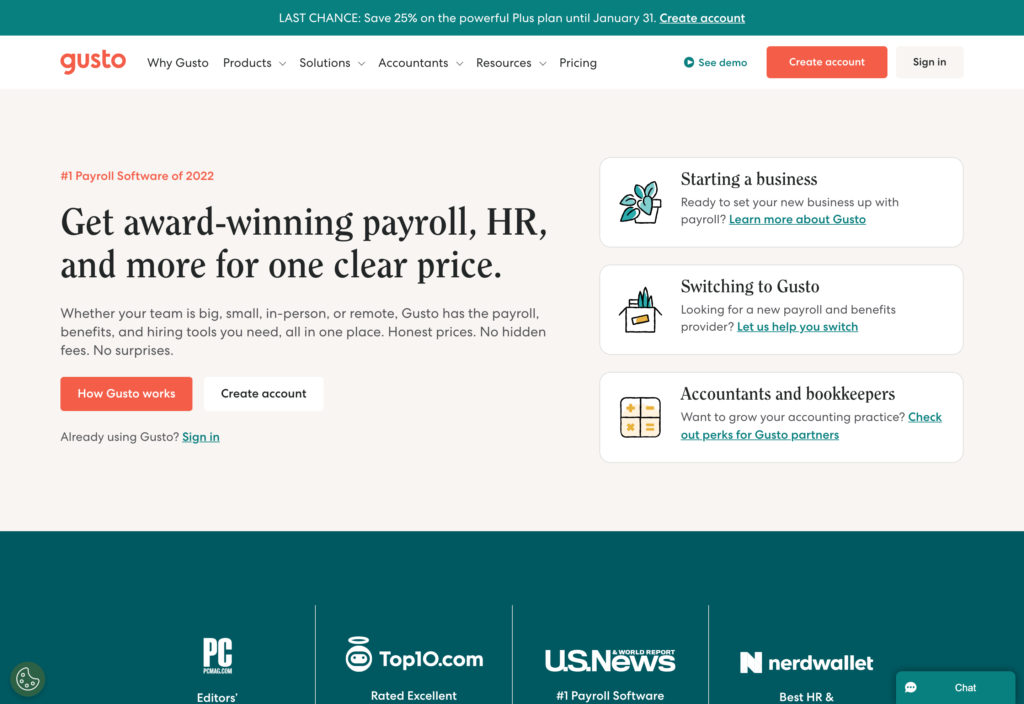
Gusto is primarily known for its exceptional payroll and HR management features, but it also offers scheduling integrations, making it a well-rounded choice for businesses looking for an alternative to 7shifts.
Why I chose Gusto: Gusto handles payroll with precision and includes time tracking features. I was impressed by how it helps you manage employee benefits.
Here’s more on its features.
Scheduling integrations
Gusto doesn’t offer built-in scheduling, but integrates with various third-party platforms—including Sling, Workforce, and Connecteam.
Integrated time tracking
I find Gusto’s time tracking to be basic yet effective—and particularly useful for small to medium-sized businesses. Employees can clock in and out through the app, and their hours are automatically synced with the payroll system. This means all worked hours, including overtime, are accurately captured and reflected in payroll.
Effective payroll management
7shifts users disappointed by the platform’s lack of built-in payroll might especially appreciate Gusto’s payroll management system, which streamlines payroll processing, tax filing, and compliance with federal, state, and local laws. Gusto automatically calculates and files taxes, which significantly reduces the administrative burden on managers.
Employees can also easily access their pay stubs and tax documents through the employee portal, which I find really convenient.
Employee benefits management
I’m impressed by Gusto’s all-in-one approach to benefits, with advisory and compliance support offered throughout the setup. Gusto makes it easy to offer and manage a competitive benefits package for your employees. Packages can include various options—from retirement plans to financial health resources to wellness programs.
HR tools and onboarding
I think Gusto offers lots of efficiency in its suite of HR tools. These include onboarding workflows that help new hires complete paperwork, set up direct deposit, and enroll in benefits before their first days. Other tools enable you to conduct reviews and set goals to improve employee performance.
Drawbacks
Gusto’s time tracking tools are relatively basic, making them less suitable for businesses that require advanced options. For instance, there’s no geofencing. Gusto also doesn’t provide its own scheduling, so users looking for an all-in-one solution must look elsewhere. The platform can also become costly for small businesses, especially as you scale and add features.
Key Features
- Payroll processing
- Integrated time tracking
- Employee benefits management
- HR tools and compliance management
Pros
- Excellent payroll features
- Comprehensive benefits options
Cons
- No built-in scheduling
- Costlier for small businesses
Pricing
Starts at $40/month + $6/person/month Trial: No Free Plan: No
-
Homebase — Good for small businesses and restaurants
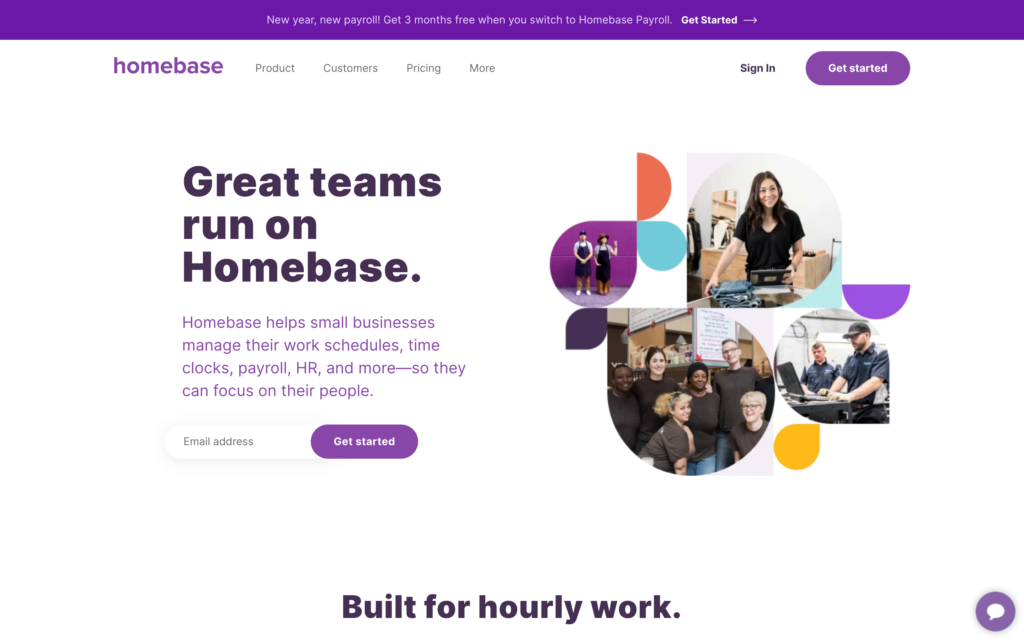
Homebase is a straightforward and budget-friendly scheduling and time tracking tool designed with small businesses in mind. Its user-friendly interface and essential features make it particularly well-suited for small to medium-sized restaurants and cafes that need a simple solution for managing shifts and tracking hours without the hassle of more complex or costlier systems.
Why I chose Homebase: I find the platform to be user-friendly and easy to navigate. Homebase simplifies tasks—from scheduling shifts to tracking time and attendance.
Let’s take a closer look at some of its features.
Efficient scheduling tools
I found the drag-and-drop scheduling tool to be one of Homebase’s most user-friendly features. Managers can quickly create and share schedules, with templates available to save time for recurring shifts. Employees receive notifications about upcoming shifts so managers can worry less about no-shows—a nice feature for restaurant scheduling. The platform also lets you easily view employee availability when you’re creating schedules, making it easier to avoid scheduling conflicts.
Time tracking
I appreciate Homebase’s handy time tracking capabilities, such as allowing employees to clock in and out via the mobile app. Like 7shifts, Homebase supports geofencing, which I think is great for preventing time theft in the restaurant industry.
Payroll features
Homebase simplifies the entire payroll process with its built-in payroll features—from calculating wages and taxes to handling direct deposits and generating tax forms. Plus, with features like automatic tax calculations and compliance support, Homebase aims to make payroll hassle-free.
Simple team communication
I really liked Homebase’s messaging feature, which enables managers to send updates, share announcements, and communicate with individual employees or groups in real time.
Drawbacks
While Homebase is an affordable and user-friendly option, it lacks advanced features that larger or more complex businesses might require, such as comprehensive reporting. Integrations with other software are also limited. Plus, some users have experienced glitches and lag with the mobile app, which raises concern about its reliability.
Key Features
- Drag-and-drop scheduling
- Mobile time tracking
- Team communication tools
- Compliance management and reporting
Pros
- Affordable pricing
- User-friendly interface
Cons
- Limited advanced features
- Occasional app issues
Pricing
Starts at $24/location/month Trial: Yes — 14 days Free Plan: Yes — For a single location & up to 20 employees
-

Findmyshift — Good for distributed teams with complex schedules
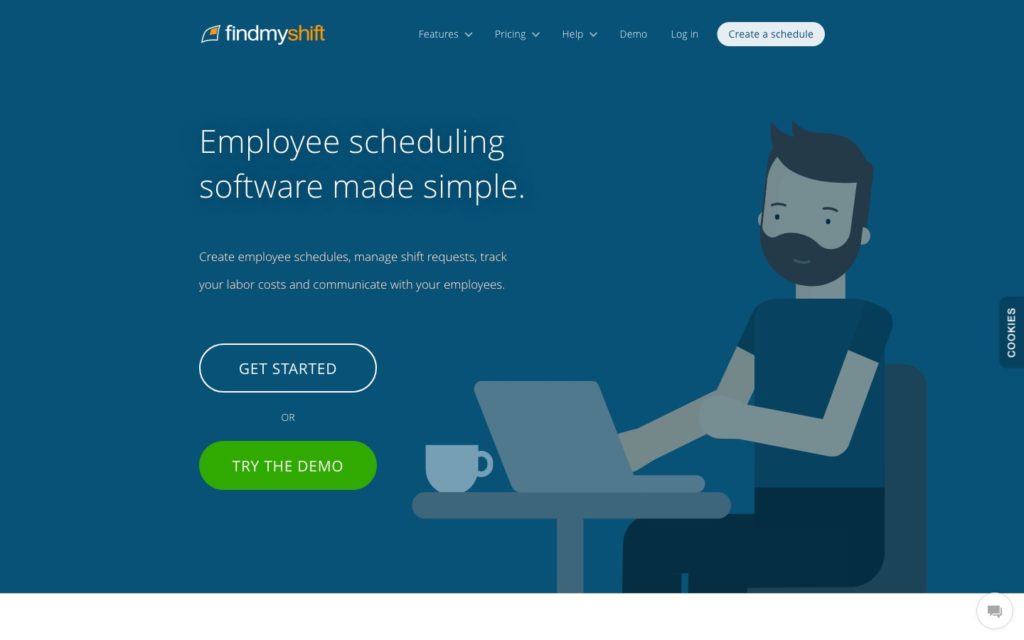
Findmyshift is a flexible scheduling tool, specially designed to accommodate the needs of distributed teams—like those at restaurants or various restaurant locations. Its powerful scheduling features, combined with time tracking and communication tools, make it a strong choice for businesses seeking a holistic solution.
Why I chose Findmyshift: I really appreciate the flexibility that Findmyshift offers, particularly for businesses operating across multiple sites. The platform can handle varied shift patterns and work arrangements, which I think makes it a standout 7shifts alternative for the restaurant industry.
Let’s look at some of its features.
Flexible scheduling options
Findmyshift excels in providing flexible scheduling options that can be tailored to meet the specific needs of your business. Whether you need to schedule regular, rotating, or ad-hoc shifts, Findmyshift makes it easy to create, adjust, and publish schedules—and set up automatic shift reminders.
One of my favorite features for restaurant operations? You can use “facilities” to create different work areas and schedule employees to those areas. This way, they know exactly where they’ll be working—whether that’s the kitchen, the bar, or the main dining area.
Comprehensive time tracking
I found the time tracking features in Findmyshift really handy, allowing employees to clock in and out through the mobile app. Managers can monitor attendance, track overtime, and generate detailed timesheets for payroll processing. It also offers geofencing.
Payroll integrations and compliance
Findmyshift integrates with various payroll and accounting systems. The platform also supports compliance with labor laws with features for managing breaks, overtime, and labor costs effectively. For instance, you can add pay rate adjustments to schedules—like when you need to pay employees overtime.
Customizable reporting
What also sets Findmyshift apart is its advanced reporting and forecasting tools. I found the platform’s ability to create detailed, customizable reports invaluable. It allows you to analyze labor costs, track overtime, and predict future staffing needs based on historical data.
The forecasting feature is particularly helpful, ensuring you’re always prepared with the right staffing levels. I think this could work very well in restaurant operations where demand is always fluctuating and it’s easy to overstaff or understaff shifts.
Drawbacks
Despite its strengths, Findmyshift’s limited integrations with other software beyond payroll could be a hurdle if you need to connect with multiple systems. Also, while the platform does enable you to see where employees are when they clock in and out, it doesn’t offer advanced geofencing that automatically prevents them from tracking time outside worksites—like 7shifts and other competitors do.
Finally, with Findmyshift, you must manually adjust pay rates to calculate overtime for specific shifts, which I think is a hassle. Many competitors (including 7shifts) automate overtime calculations more fully—for instance, after managers configure overtime settings, the system might handle everything else.
Key Features
- Flexible scheduling options
- Mobile time tracking
- Real-time communication tools
- Integration with payroll systems
Pros
- Flexible scheduling
- Suitability for remote teams
Cons
- Limited integrations
- Basic reporting features
Pricing
Starts at $25/team/month, for 20 team members Trial: Yes — 3-month Free Plan: Yes — for up to 5 team members
-
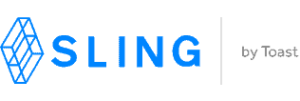
Sling — Good for real-time communication
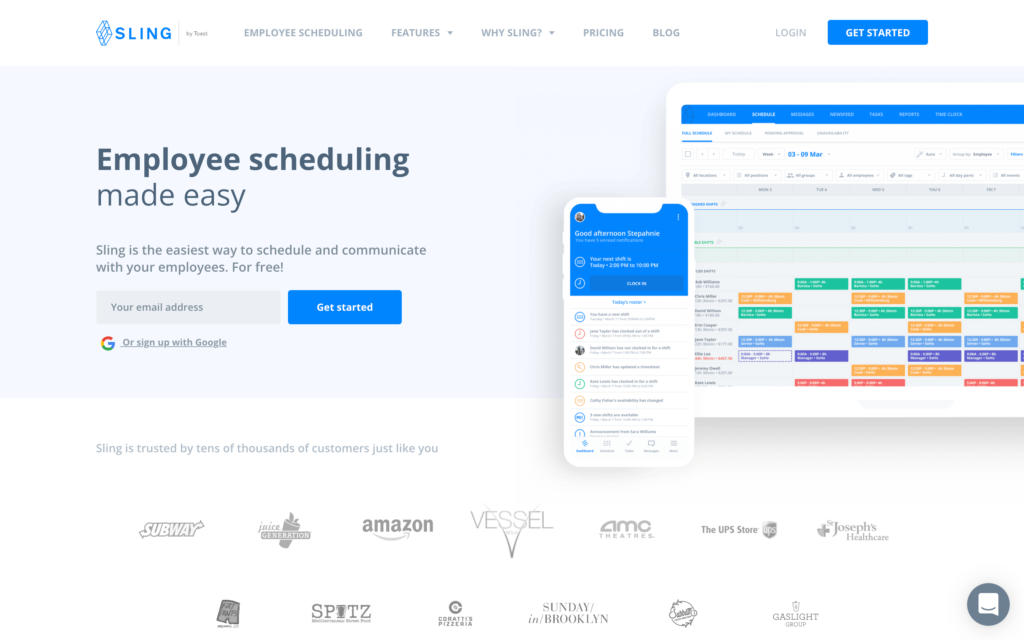
Sling is an intuitive scheduling tool for small business owners, streamlining shift management, work hours and payroll. Like 7shifts, it’s tailored for the restaurant industry, but its features suit other sectors, including retail or leisure.
Why I chose Sling: Sling stands out for its focus on real-time communication, which is essential for businesses that require constant coordination among team members. I like that the scheduling tools are easy to use and integrate well with its messaging features. Plus, the level of automation really adds to the user experience.
Let’s explore its features in more detail.
Intuitive scheduling
Sling stands out with its intuitive scheduling that simplifies creating and managing shifts, including a drag-and-drop feature. With multiple schedule templates, you can easily schedule your week, while staff have the flexibility to swap shifts or pick up open slots.
Time tracking
Sling offers various time tracking tools. Employees can clock in and out via the mobile app, and there’s also a kiosk option. You can track overtime and send reminders to employees so they clock out for breaks. You can also opt to track time according to scheduled shifts to avoid extra minutes on employees’ timesheets that accrue when they clock in early or clock out late.
Plus, software offers geolocation tracking and geotracking.
Real-time communication tools
One of Sling’s most valuable features is how well it allows managers and staff to communicate. The real-time updates and notifications features are great for keeping everyone informed of last-minute changes. The messaging functionality is easy to use, and I think frontline businesses that need to coordinate quickly and effectively—including restaurants—will find it valuable.
Labor cost management
Sling provides plenty of additional tools to manage labor costs, allowing managers to track hours worked, monitor and manage overtime, and ensure that labor expenses stay within budget.
Drawbacks
Unfortunately, Sling doesn’t include built-in payroll and offers few direct payroll integrations compared with other platforms, including 7shifts. While it does offer integration with some major payroll providers, like Gusto, the depth of these integrations can vary. For example, automating all aspects of payroll processing or syncing data in real time may not be possible.
Its reporting features are also pretty basic, so if you need in-depth data analysis, you might find it lacking.
Key Features
- Drag-and-drop scheduling
- Real-time communication tools
- Mobile time tracking
- Labor cost management
Pros
- Easy scheduling
- Affordable pricing
Cons
- Basic reporting features
- Limited payroll integrations
Pricing
Starts at $2/user/month Trial: Yes — 15-day trial Free Plan: Yes — Up to 50 users (Changing to 30 users from March 1st, 2025)
Compare the Best 7shifts Alternatives
| Topic |
 Start for free
Start for free
|
|
|

|

|
|---|---|---|---|---|---|
| Reviews |
4.8
|
4.6
|
4.6
|
4.6
|
4.6
|
| Pricing |
Starts at just $29/month for the first 30 users
|
Starts at $40/month + $6/person/month
|
Starts at $24/location/month
|
Starts at $25/team/month, for 20 team members
|
Starts at $2/user/month
|
| Free Trial |
yes
14-day
|
no
|
yes
14 days
|
yes
3-month
|
yes
15-day trial
|
| Free Plan |
yes
Free Up to 10 users
|
no
|
yes
For a single location & up to 20 employees
|
yes
for up to 5 team members
|
yes
Up to 50 users (Changing to 30 users from March 1st, 2025)
|
| Use cases |
The best alternative to 7shifts
|
Good for payroll and HR management
|
Good for small businesses and restaurants
|
Good for distributed teams with complex schedules
|
Good for real-time communication
|
| Available on |
Final Thoughts on 7shifts Alternatives
Finding the right employee scheduling software is key for any business, especially in the restaurant industry. While 7shifts has been a popular choice, some users are seeking alternatives due to its integration challenges, clunkiness, and glitches.
While Gusto, Homebase, Findmyshift and Sling are all notable substitutes, Connecteam stands out as the best alternative to 7shifts. It’s a comprehensive solution that includes user-friendly scheduling, advanced time tracking, effective communication tools, seamless integrations, and so much more.





